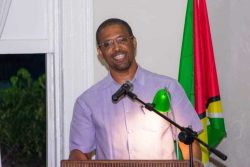 Cricket is in Caribbean blood, like curry, and music with lots of bass, so it’s not surprising to see columnist Orin Davidson fiercely lamenting the continuing malfunctions of the West Indies Cricket Board. Orin’s frustration is echoed in every corner of the region. It pops up in the media and among sports fans beating some beers; you hear it in passing conversation on the street; even the ladies are now grousing about it.
Cricket is in Caribbean blood, like curry, and music with lots of bass, so it’s not surprising to see columnist Orin Davidson fiercely lamenting the continuing malfunctions of the West Indies Cricket Board. Orin’s frustration is echoed in every corner of the region. It pops up in the media and among sports fans beating some beers; you hear it in passing conversation on the street; even the ladies are now grousing about it.
Furthermore, while we’re hearing more about it now, the condition is not an aberration, or a one time thing. The WICB, from the time of Pat Rousseau has been a case of disaster following disaster. It is particularly galling, as Orin points out that we all recognize the rot, cricket experts bemoan the rot (Cozier; Holding; Lloyd; Dujon; Murray), objective appraisals identify the rot (Patterson; McDonald), but the rot continues. I outlined some of them in a song I recorded last year suggesting that the WICB “Take A Rest”, and I even suggested a bumper sticker campaign simply saying “Take A Rest” to propel some action from shame since no other lever seemed to be working.
However, although I didn’t declare it in the song, I was not optimistic that changing WICB personnel would fix matters because while the administrators have been clearly at fault, the deeper problem is in the structure surrounding them. Go back into Caribbean history and look at the initiatives in concord we have undertaken. Go back as far as the Standing Free Committee when we were colonies. Go back to Federation, and Carifesta, and then Caricom. Look at all the travails over the CCJ. More recently, think about the CSME, and free movement of labour and goods. After umpteen heads-of-government meetings, on the very day I am writing this, producers in Guyana are asking Caricom to do something about the foot-dragging on free trade. Think about the recent EPA furor which is still playing out. To look at that history is to realise that there is one common ingredient in all those failures and it is that they are regional efforts – that is the rock on which they founder, and the WICB, itself a regional body, is foundering on the same rock.
Cricket in England is one nation; Australia, one; India, one. In the West Indies our cricket is an attempt by several nations (9 or so?) to form a team and therein lies the dilemma as the other regional experiments at concord show. With several chiefs, in the form of individual boards, sitting in the teepee, the result is that there is ultimately no accountability, and anyone who attempts to behave as chief is quickly silenced. Recall the furor when Keith Mitchell had the effrontery to suggest reforms in our cricket structure. Owen Arthur jumped all over him, questioning his authority to proclaim anything, and Mitchell inevitably went back into his corner, and the old boys’ club continued on its way.
Reflect on this: West Indies cricket is the only international sport team that is actually made up of several nations competing under one banner. We have no West Indies soccer team; no West Indies swimming team, or tennis team. (Well, we tried it once in soccer, and it died aborning.) The answer is that the differing national priorities make for an unworkable mix, and that has been the story since we went our separate national ways.
If as West Indians we cannot achieve accord on such critical matters as our economic salvation, or the free movement of labour, or a common currency, how can we expect to find it in cricket? And before you tell me it worked previously, remember that was when we were, in effect, one colonial region under one mother. Once the independence movement started, rightly encouraging national flowers to bloom in every territory, the basis of our earlier consensus began to unravel. Sure, as Michael Holding has pointed out, the regimented influence of the Packer years, and the serendipity of a once-in-a-lifetime flow of talent, held things together for a while, but inevitably the internal political strains that wreaked havoc with Federation, and every regional institution since, are the same ones behind the disarray we now see in the running of cricket. As the line in the song goes, “this is not a board; this is sawdust and Crazy Glue”.
Reflect how we used to rail at poor Pat Rousseau in his time at the helm; “to make the thing go, move Rousseau?” Well, the line of failures behind Rousseau, including the revered Wes Hall, business tycoon Ken Gordon, and now Hunte, shows that the dilemma resides in the very structure of the thing, and because the problem is really our inability to find concord as a region, the solution is daunting . One possibility may be the Tony Cozier suggestion of some sort of sports franchise format, set up to operate as a business, with no political baggage, and with private sector support from companies like Digicel and others. With our persistent mania for cricket, and the world’s fascination with our style of play, such an approach might be workable once the political strings have been cut and some kind of monolithic accountability established.
Mind you, the same differing national priorities that bedevil our cricket now may also infect that approach, as well, but the professional administrators and established business people involved may be able to steer a way through once the political pressures from the various national interests become minimized.
Be that as it may, Orin’s article comes very close to the essential point, which is that we are approaching critical mass and recent rumblings from Trinidad suggest that while trouble may not have landed it is clearly on the horizon. The Santayana quote that “those who don’t know their history are doomed to repeat it” comes to mind. Many of us will recall the demise of the proposed West Indies Federation when Jamaica’s decision to opt out led the then Trinidadian Prime Minister Eric Williams to remark that “Ten minus one equals zero.” In the present cricket scenario, with Trinidad’s concern surfacing, some one of the other countries may soon be applying the same political maths to our cricket team.








